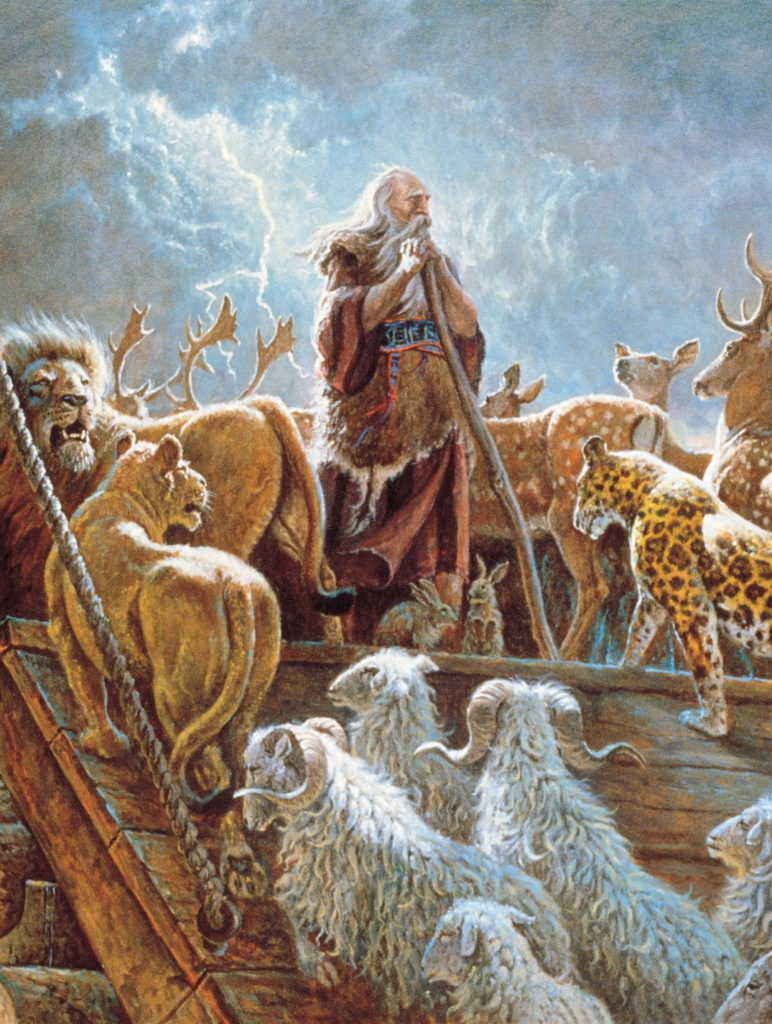“Noah built an ark; and…the Lord smiled upon it.” (Moses 7:43)
by Taylor Halverson
[Reprinted with permission from The Interpreter Foundation]
Introduction
The great cataclysmic[1] flood wherein “Noah…prepared an ark to the saving of his house” is one of the most well known stories in the Judeo-Christian world. It is story that most of us can remember from our youngest days. If needed, anyone of us could offer a simple synopsis of what occurred: God came to the prophet Noah, warned him of the impending flood, commanded him to build an ark and gather unto temporal salvation all living things into it. Noah obeyed. The mighty windows of heaven were opened and the great deluge commenced to destroy all flesh save it be what had been safely gathered into the ark. As soon as the flood ceased and dry land reappeared, Noah offered sacrifice of thanks unto God and God reestablished his covenant with Noah and his seed offering the sign of the rainbow as a token that such destruction will never come again among the children of men.
But what is the purpose of this account? What doctrines or gospel principles does this scriptural account offer to us? What does any of this mean today, thousands of years after the fact? Our lesson today will look at each of these questions briefly, for it would be impossible to give an exhaustive treatment of any one of these questions.
The Purpose of the Flood Story
Among the many purposes for the scriptural account of the flood story let us consider the following:
- Cleansing and recreating the earth
- God reestablishing the covenant with his righteous people
- Establishing continuity of prophets and priesthood from Adam through Noah to Abraham
In the beginning God created the heavens and the earth and all things that are in them. At each stage of the creation God looked upon his work and pronounced it good. However in the days of Noah “the earth…was corrupt before God, and the earth was filled with violence. And God looked upon the earth, and, behold, it was corrupt; for all flesh had corrupted his way upon the earth” (Gen. 6:11-12). Violence was upon the earth and violence brings death and destruction, the antithesis of creation and replenishing the earth.[2] That which God had pronounced good had now turned corrupt and God desired to cleanse and recreate his creation.

Question: Why would a loving God kill innocent children in the flood of Noah’s day?
Reconciliation of the Flood of Noah with scripture and Church teachings
Is the Tower of Babel historical or mythological?
How were the languages confounded at the tower of Babel?
What Was All the Confusion About at the Tower of Babel?
In the Bookstore:
In Tune: The Role of the Spirit in Teaching and Learning
The Abrahamic Religions: A Very Short Introduction
A New Approach to Studying the Covenants of Our Fathers: A Harmony of Genesis, Moses and Abraham
Come, Follow Me—For Individuals and Families
Come, Follow Me—For Primary | Sunday School
Jan 31-Feb 6 Genesis 6–11; Moses 8 “Noah Found Grace in the Eyes of the Lord”
